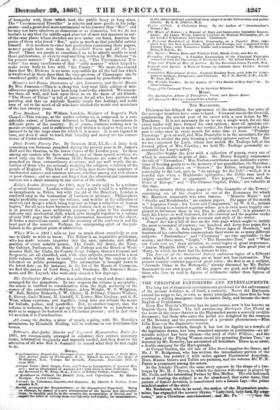THE MAGAZINRS.
Christmas has delayed the appearance of the monthlies, 'but some of the younger members have come to hand. Foremost stands the Cornh4l, commencing the second year of its career with a new fiction by Mr. Thackeray. It is not necessary for us to say a single word, for ere this every reader will have formed his own-opinion ; were all opinions col- lected they would join to make one verdict, for there is promise of a plea- sure to come once in every month for some time at least. "Tramley Parsonage" goes on well, and Miss Dunstable is in the ascendant, for she is about to receive the only blessing a wealthy spinster cannot buy. But we are concerned for Lucy, whom last month Mr. Trollopo left at the fevered pillow of Mrs. Crawley ; we hold Mr. Trollope personally ac- countable for Lucy's safety. Macmillan begins the year with a collection of papers, every one of which is seasonable in point of date. Mr. Henry Kingsley commences the tale of "Ravenshoe ;" Mrs. Norton contributes some authentio correc- tions of floating gossip as to the memory of her grandfather, the Sheridan ; Miss Muloch discourses on " Sorrow ;" the Editor, bringing his own
nationality to the task, puts in "an apology for the Celt"—wellpit is a hopeful sign when a Highlander apologizes ; the Celtic race used to employ another line of argument. Two papers "Venetia and the Peace of Europe," and "The Chinese Capital, Pekin," are valuable at this time. Bentley devotes thirty-nine pages to "The Constable of the Tower," containing six of the chapteis of one of the Romances for which Mr. Harrison Ainsworth was once famous. "-Mimetic Music" and " Goethe and Mendelssohn" are curious papers. The paper of the month is "Augustus Ctesar ; his Court and Companions," by-W. 5.0., initials which belong to a learned registrar whose pen is even more happily em- ployed in literature than in the files he edits so well: it is pleasant to have his leisure so well bestowed, for the classical and the popular reader will be equally gratified by the accuracy and style of the writer.
Temple Bar has a bill of fare on the title-page which ought to satisfy the most economical of readers ; one hundred and forty-four pages for a shilling. Mr. G. A. Sala begins "The Seven Ages of Mammon," and fourteen of his contributors communicate their views on as many different subjects. "Pantomimes" and " Christmas " are two applicable to the season ; and three more, "Light," "The Houselees Poor," and "What our Coals cost us," draw attention to social topics of great importance. " Annus Mirabilis 1860," is a valuable summary of this great year of 'Sixty, in which we have had the honour to live.
The Journal of the Statistical Society embraces topics of a different order, -which, if not so amusing, are at least not less instructive. The
present number contains papers of great value ; the first is on a subject, "Juvenile Crime in the Metropolis," already discussed by -Mr. Barber Beaumont in our own pages. All the papers are good, and -will Aeljght those who love to read in figures of arithmetic rather than figures .of speech.


























 Previous page
Previous page